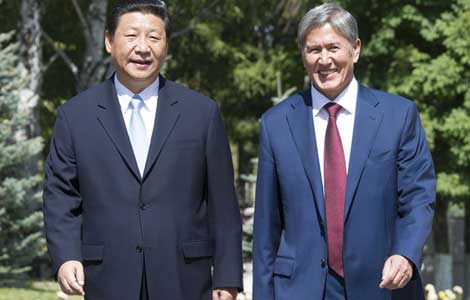
Tokyo's lack of sincerity means no China-Japan summit at G20
Updated: 2013-09-05 17:27
(Xinhua)
|
|||||||||
TOKYO - With both Chinese and Japanese?leaders gathering in the Russian city of St Petersburg for a G20 summit on Thursday, curiosity arose over the possibility of a sideline contact between the two neighboring countries.
On the eve of the G20 summit, a senior Japanese diplomat said that Tokyo is working for a chat between Prime Minister Shinzo Abe and Chinese President Xi Jinping, although a formal meeting is out of the question.
However, Chinese Vice-Foreign Minister Li Baodong had made it clear last week that there is no basis now for a leaders' meeting, casting doubt on the likelihood of any form of bilateral talks in the near term.
China's resolute refusal is a strong message to Japan that Tokyo is responsible for the current deterioration of bilateral ties and should bear the consequences.
Since the Japanese government took the aggressive approach to nationalizing the Diaoyu Islands, China's inherent territory, a year ago, relations between the two East Asian neighbors have sunk to the lowest point in years.
By repeatedly calling for talks, Japan appears to be in good will to repair its strained ties with China, but its sincerity is so doubtful.
A man should be judged by his deeds, not his words. The same logic applies to a country.
On the one hand, Japan held out the olive branch with a vocal offer for dialogue. On the other hand, the Abe administration has never stopped offensive remarks and provocative moves that have destroyed the mood for any dialogue.
In the latest incident, an hawkish Abe broke with two decades of tradition by omitting any expression of remorse for Japan's past aggression in Asia on the 68th anniversary of its World War II surrender, while on the same day three members of his cabinet visited the controversial Yasukuni Shrine, where notorious war criminals were honored.
The continuous denial of history hurt the feelings of the peoples in neighboring countries, including China, which suffered atrocities of Japanese invaders.
As to the Diaoyu Islands, Abe has been flatly denying the existence of a dispute with China, effectively shutting the door for any candid talks.
If with nothing put on the table, the so-called meeting would be for nothing but a handshake and photograph. There is no reason for empty talks to be wedged into the leaders' already busy schedule.
If Japan continues to talk in one way and act in another, even a polite chat is unnecessary.
It has to be pointed out that China has always insisted on dialogue to resolve disputes between countries. If Japan is really sincere in its call for dialogue, it should take real actions to create a right atmosphere, instead of playing to the gallery.
Related Stories
No plan for China-Japan meeting 2013-08-29 17:26
China-Japan bilateral meeting unlikely at G20 summit 2013-08-27 16:08
China, ROK urge Japan to reflect on its history 2013-09-04 16:21
Japan in danger of losing moral compass 2013-09-04 07:31
No excuse for rise of Japan's militarism 2013-09-03 21:18
China urges Japan to earn international trust 2013-09-03 18:50
Schedule









